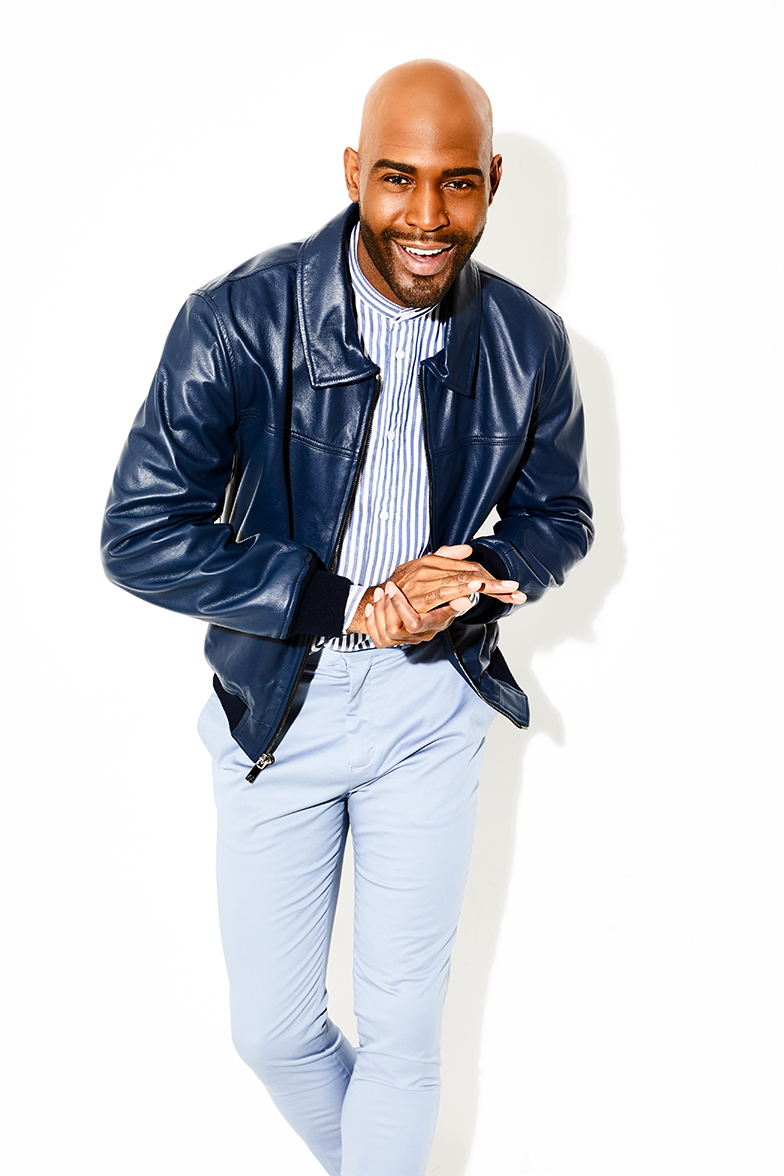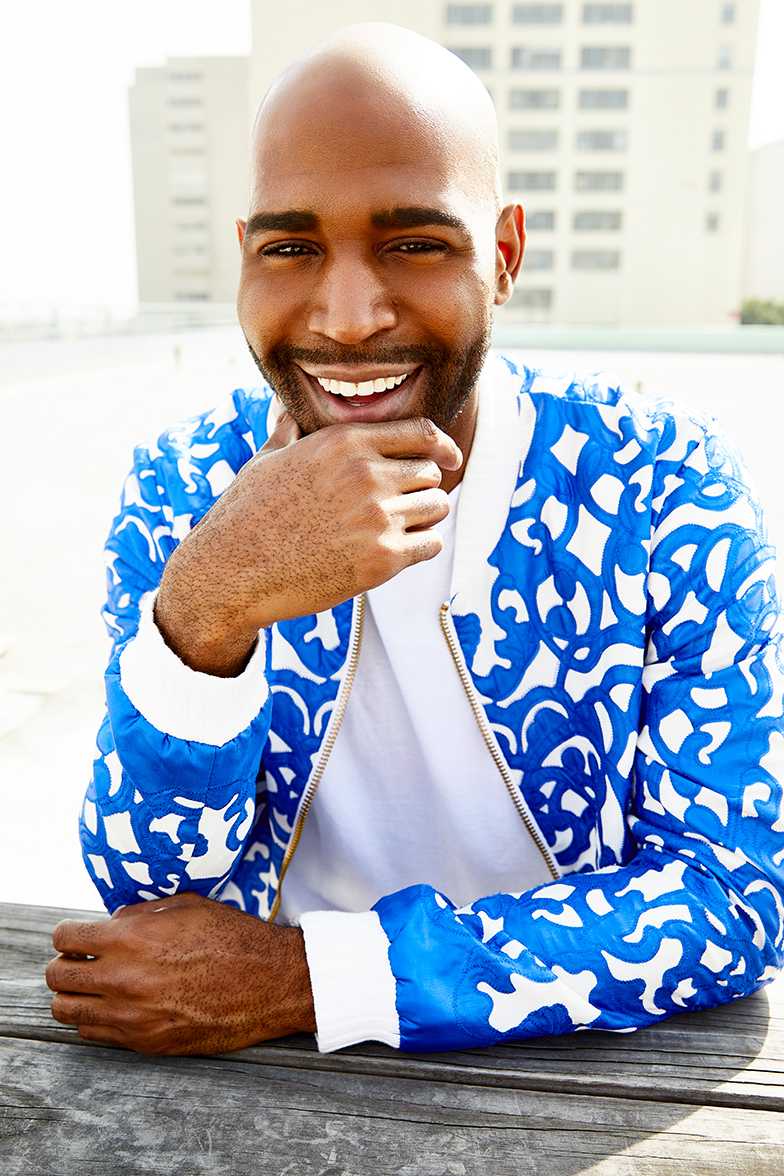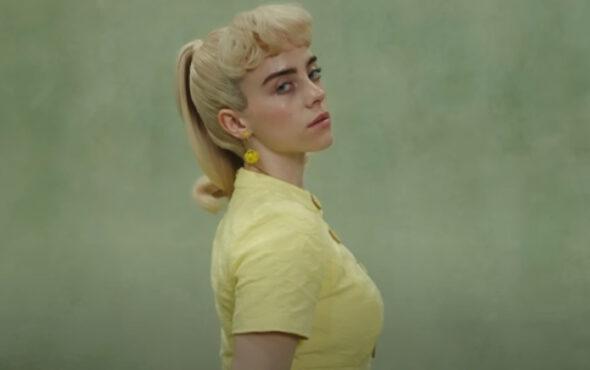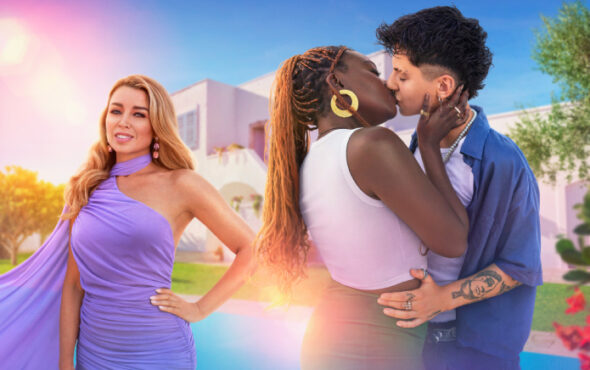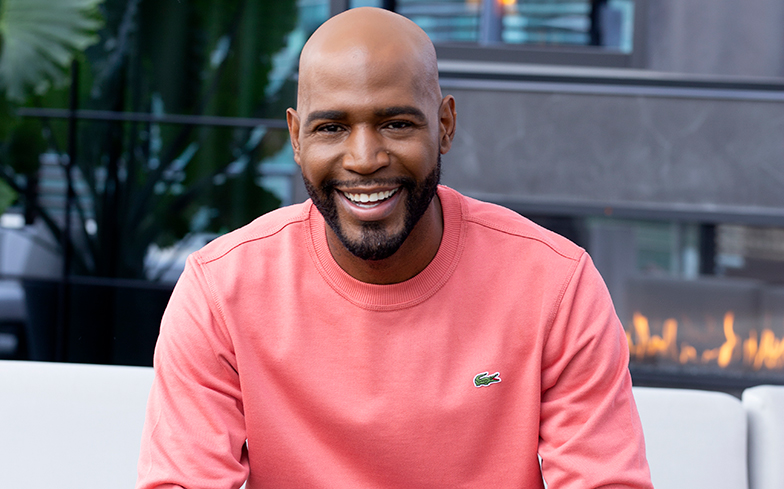
As Queer Eye’s resident culture expert, Karamo Brown has taken on the most ambiguous role and turned it into arguably the most important one of all.
While the rest of the Fab Five tackle specific areas such as food, fashion and hair – improving the hero’s outward appearance and environment – Karamo gets to the core of who they are, offering advice on personal issues, relationships and gaining confidence. So it was almost inevitable that a book would follow. Part memoir, part life guide, Karamo: My Story of Embracing Purpose, Healing and Hope is a deeply personal insight into the life of a modernday queer star, and the experiences that got him to the place of confidence he’s now in.
“To be honest with you, I originally set out to write an advice book,” he tells us, “but the publisher in all of their wisdom was like, ‘There’s a lot of people who still don’t know much about you, and while they love seeing you give advice, people need to learn about your wild and amazing journey to where you are today’. And so, I found a happy compromise where I shared intimate stories from my life that are universal enough that people can learn from what I did, and get advice based on how I handled it.”
Opening up about everything from addiction to his experiences in abusive relationships, we caught up with Karamo to find out why it was so important for him to share so much of himself with the world, and why everyone should be given the chance to learn from their mistakes.
You really lay your soul bare in this book. Are you nervous to share such intimate details with readers?
No, not nervous at all, to be honest with you. I started my career in reality television when I was 22, and when you’re on reality television you’re either open and honest, or you’re not, and if you’re not the audience realises it and you’re probably never seen again. All those experiences have allowed me to realise that just being truthful about who I am and what I’ve experienced is the greatest tool for me to heal, but also the greatest gift I can give to others to help them to grow and to learn. Even as a psychotherapist, it’s always a great joy when I’m able to share a small bit of who I am to give them insight and show them they’re not alone, I’ve been there too.
Was there anything that was off limits?
No, I talk about everything, although there was a little bit my mother asked to be edited out. I went into a lot of detail about the physical abuse that she experienced at the hands of my father, and she was just not in a place where she wanted to relive that, she’s still healing from that, and so she asked for that to come out. But I don’t think it took away from that chapter at all, because that was really meant to show that domestic violence in the LGBTQ community is a big issue, especially here in the US, it happens at a higher rate than heterosexual couples, and though I am somebody who advocates for the protection of women, I was in a violent relationship where I was the abuser. I grew up in a house where abuse was prevalent, and so when I got into my relationship, I knew you couldn’t hit a woman, but how do you explain that to a man hitting another man? So when I had anger issues I would hit him. Luckily I’ve asked for forgiveness and gotten help since then, but I wanted to address domestic violence and how the chain from my mother and father to me has occurred. But she wasn’t comfortable with me going into detail about what she went through, so I went more into detail about what I went through.
You’ve also been open in the past about your struggles with mental health – has the extra attention you’ve received since starring in Queer Eye affected that?
My mental wellbeing now is very positive, because I have the tools to deal with it. When I feel anxiety or pressure, I know how to handle myself. It’s like when you go to the gym and you’re getting your fitness together and you’re like, ‘Oh, I’m at a good place, I know what my body needs from me’. I’m in that really good space right now. I also have a mental health buddy, a bit like a fitness buddy, who I always check in with on top of my therapist. So my mental health has been good, and I think the greatest gift I’ve been able to give people is to show them that you can get out of that dark place, and you can grow and heal and have the life you want. In my book I give people the tools to do that.
As you mention in the book, you’ve had your own low points but you’ve managed to get through them and become a better person. Lately, we’ve seen a lot of celebrities being ‘cancelled’ for things they’ve done or said in the past, despite seeming like good people now. Do you think this ‘cancel culture’ is a healthy way to go forward?
I think it’s a completely unhealthy thing. When we cancel people, we’re saying to young people who are watching, ‘There’s no chance to grow and heal’. Not one of us are free from making mistakes, we’ve all made mistakes, every human being – some worse than others in certain people’s eyes – but we should give people the opportunity to acknowledge what they’ve done, to learn the tools to not make that mistake again, and to show that they won’t make that mistake again. If we never allow people to gain forgiveness and gain an opportunity to be better, what world can we expect? We’re going to have people on one side who feel rejected, and people on the other side who feel superior, and that’s not okay with me.
Addiction is another thing you talk about in the book. What advice would you have for people who see addictive tendencies in those around them, but don’t know how to help?
I think the first thing to do is not to ignore it. I was in a space where most of the people around me saw me using weed and then ecstasy and then eventually cocaine, and they would just laugh it off, or they would make a snide comment behind my back instead of acknowledging it in a healthy way. That’s a hard thing to do because sometimes addicts don’t want to hear that they’re in that addictive space, but I think acknowledging it by letting them know that you’re there to support them, not to judge them, is key. People who are in some type of addictive space want to know that they’re going to be supported, not judged, because that’s just going to make them feel worse. Usually at the root of addiction there’s some kind of shame or pain that’s causing them to have that addiction. So if you say, ‘I understand that there’s probably something that’s hurting you, I want to be here to support you, I want you to know that I love you’, that’s the correct way to help them. I think the next thing is giving them clear opportunities to explore rehabilitation. So instead of just saying, ‘You should get help’, actually have something available for them, find resources online, or numbers they can call, because most of the time if addicts had the strength to find those resources on their own, they would’ve already done that. So providing that opportunity for rehabilitation is a great way to help.
One of the things in the book that really stood out was that you felt you had to work twice as hard as your white classmates to be a success. Do you still feel that expectation now?
Yes, 100%. I think systemically there is a privilege that comes with being a white male, and me being an African-American male from immigrant parents, with a name like Karamo, has caused certain institutions to feel as though I’m not as desirable or worthy. So to prove I am worthy, I’ve had to work a little bit harder. But that’s okay with me. Working hard is not something I’ve ever been afraid of, and working hard and acknowledging and helping people to realise that there are still these systemic issues is very important. Let’s be real, when it comes to people who are of colour, or immigrants, or women, or LGBTQ people, we do all have to work harder, so I’m not going to say my struggle is worse than theirs. We do all have to acknowledge that if I’m a woman walking into a workforce, I’m going to feel the pressure of knowing I need to work harder than this white male counterpart, because he’s already getting opportunities that I’m not getting. Even for a gay white man, there are going to be situations where he feels like he has to work harder. There’s also an economic divide between poor white people and affluent white people. So there are all these levels to it, I’m just acknowledging that, yes, I am a part of this system where I do have to work harder
You obviously give great advice and come across as ridiculously confident on the show, but are there times where you don’t feel confident or you have doubts about yourself?
Oh my gosh, of course! If anyone ever tells you they’re confident 100% of the time, run from them because they’re delusional. Right now, I’m going through a physical lack of confidence, I had an allergic reaction and my eyes have broken out really bad so it’s caused me to wear glasses. I have good eyesight, but to block the spots that have come up I’ve been wearing fake glasses because I feel so unconfident being in public and having these bumps on my face. Sometimes I look in the mirror like, ‘Ugh, I don’t want to go outside because people are going to judge me, they’re going to think I’m unattractive’. It’s hard. There are other days where I’m like, ‘Am I reaching enough people? Are people getting my advice?’ But I always tell myself, ‘Don’t beat yourself up, it’s ok, you’re human, you just have to do the best you can’.
What would you say is the best thing about having the platform you’ve got now?
I travel the world a lot, and I’ll go to China and people will run up to me and start crying on my shoulder. It makes me feel good that people feel comfortable enough to have that emotional reaction. They’re not crying because they’re seeing me, they’re crying because they feel that relief. To have that positivity is just amazing. I think that’s the best part of it all.
Karamo: My Story of Embracing Purpose, Healing and Hope (£18.99, Simon & Schuster) is published on 4 April.
Photography Storm Santos
Fashion Lisa Cameron
